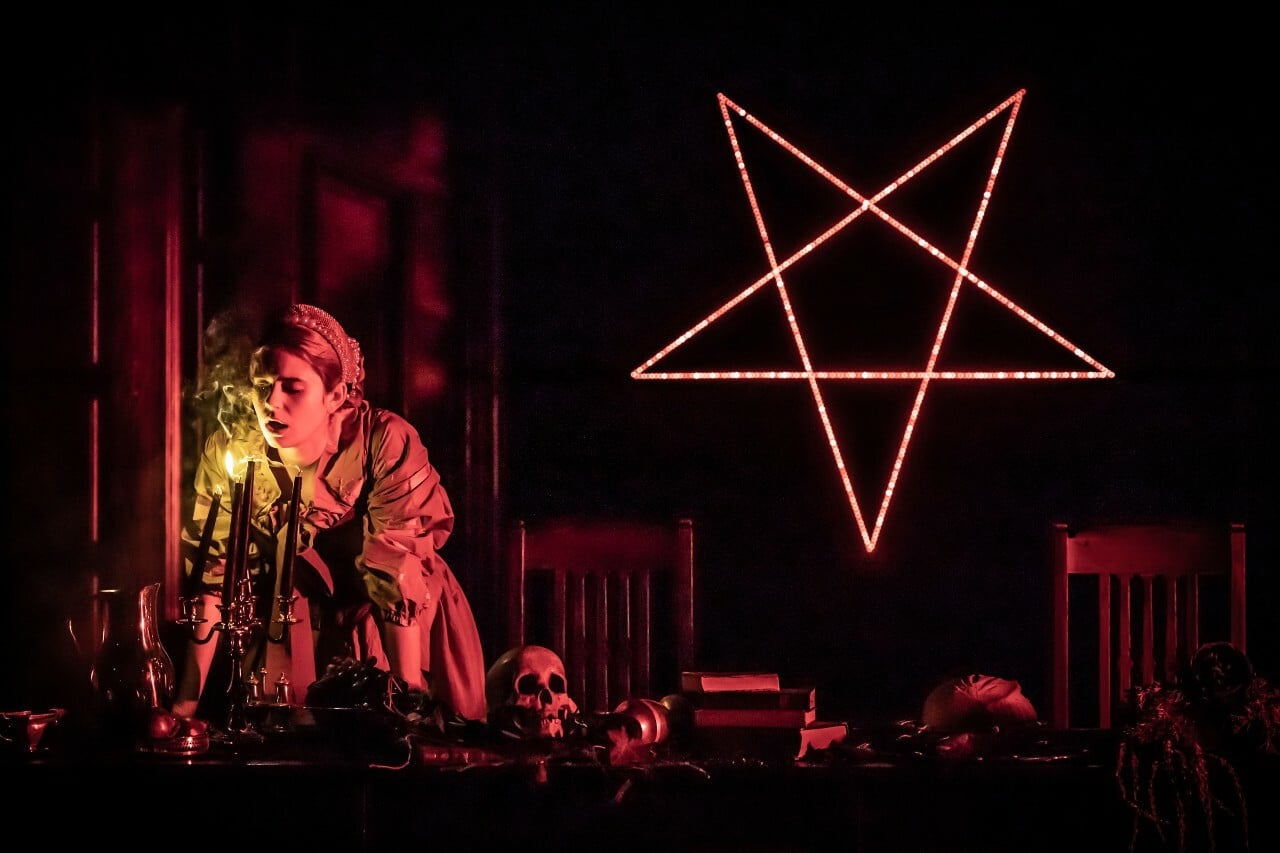Almeida Theatre
With Arthur Miller’s The Crucible popping up like a perineal plague (the Gielgud in June if you’re interested) Britain’s obsession with witches, misogynism and singeing is alive and well. But what if we turned all that on its head? Well….
Let’s pull things back, to the very country the Puritans of Salem were fleeing. 1640, Charles the I’s realm on the very brink of civil war. Lulu Raczka’s romping, biting, hilarious, and conflicting dark comedy starts with the devil himself. A good start. Suited, horned and silky in the rare proscenium arch built for the production. Lamenting the “disappearance of evil” (interesting only 10% of the British public now believe in him) he sets us up for an evening engrossed in exploring one’s cheek with one’s tongue.
In the white checked floor and long wainscoted hall of Miriam Buether’s chic set (which wouldn’t look out of place on a Chanel runway) a perplexing grapple for power unfolds. Lydia Leonard is our matriarch aptly named Elizabeth (like everyone is in this period apparently). Lady of the manor, sacrificing everything for the order that is being ripped apart across the country around her. A mannered, layered, and menacing performance her comedic timing is matched by expressive fluttering hand movements, utterly addictive to watch. Her blundering brother (Leo Bill) is the reluctant royalist and ineffective aristocrat. A bawling petulant child with all the power of the establishment behind him, though run circles around by almost every other character.
Then we have our troublemaker, our agent of chaos, our alleged witch, Agnes. Alison Oliver is all ferocious passion and conflicting motivation. The reluctant succubus rises from milkmaid to considerably higher, but then flounders in what she wants. A human dabbles with the devil, replete with a heady blend of indecision and ambition.
The 17th-century paranoia of evil, women, class, religion, and duty are at times laboriously discussed. Yet the real highlight is Raczka’s ability to flip everything topsy-turvy-ways, deliciously so. The conflict is between the women of the house: the poor unloved new wife Katherine (Ioanna Kimbook) Elizabeth and our rising servant. Accusations, sexual deviance, infanticide, roleplay, out-and-out violence, magic, and culinary manipulation are the weapons at play. The speedy verbal battles are clipped and cruel.
Rupert Goold as always runs a tight ship. A four-poster bed rising from the floor like an apparition, constant banging of heavy wooden doors, unsettling fox calls, and haunting vocal work from the chorus-like maids. His reinvention of space on the whole works but sometimes the long room feels over-stuffed when simultaneous scenes run, rather baffling.
The frantic canter of the first act rather exhausts itself in the second. Flashing Pentagrams read more like the new Hocus Pocus film and the end feels stunted. Nathan Armarkwei-Laryea gives a suave and paired back reintroduction as the devil in many disguises. However, his monologues about the play’s clever pertinence to our recent troubles is a little on the nose… or horns in this case.
Nevertheless, Women, Beware the Devil brings something shockingly new to the ideological cauldron of the Stuart era. Constantly confusing, delighting, and scandalising. The pearls swing and hooped skirts are hoiked up from their floor-sweeping positions. Ambition and want especially in the female characters are explored with a devilish glint in the eye and a demonic grin at the mouth. This miasma of unadulterated desire bellows out into the audience, hopefully, unable to find a foothold in the shining souls of the London theatre-going public.
Click here to catch the next great production by the Almeida!



